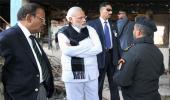For the first time in our political history, Pakistan has become centre stage of the incumbent's campaign, points out Shekhar Gupta.
Illustration: Uttam Ghosh/Rediff.com

In the years I used to travel frequently to Pakistan to report, one of its illustrious high commissioners to New Delhi asked me in jest and some exasperation as I made yet another visa application: Why are you so interested in my country's affairs?
Because, excellency, I replied with usual journalistic chutzpah, Pakistan's politics is India's internal affair.
Little would we imagine that the tables would turn and India's politics would become Pakistan's internal affair instead.
That is precisely how we should read its Prime Minister Imran Khan's statement that a second term for Narendra Damodardas Modi and his BJP will be good for Pakistan, and hold out better prospects of a settlement on Kashmir.
It is hard to recall a serving Pakistani chief executive take such a clear position on his (or her) preferred outcome of an Indian election.
His citizens do not vote in India.
Indian voters won't listen to him.
We cannot, therefore, accuse him of endorsing a candidate here.
Nor can the Election Commission of India send him a notice.
Its model code of conduct doesn't apply there and it is having a hard-enough time enforcing it where it actually does.
But note the absence of comment, forget condemnation, even from our ministry of external affairs.
What does its silence tell us?
It could possibly be that, in the current situation where the entire 'system' responds to one Supreme Leader (not my description for Mr Modi, but BJP spokesman Sambit Patra's), no one would risk condemning something that looks like an endorsement for him, never mind who it comes from.
But then, nobody would dare welcome it, or thank him either.
Why? Because he is saying Mr Modi's re-election will be good for Pakistan as it will be positive for lasting peace with India.
This is contrary to this government's KRAs in this campaign.
It has taken months shifting the discourse from the economy, jobs and vikas to Pakistan, terrorism, Muslims.
It is seeking a second term on the promise of teaching Pakistan a lesson, an aar-paar ki ladayi (decisive war) no matter what and how long it takes.
It isn't seeking a vote for making peace with Pakistan.
To that extent it can see Imran's kind words as a trap.
It is reasonable to conclude at this stage that for the first time in our political history, Pakistan has become centre stage of the incumbent's campaign.
Weigh the facts and see who it is that walked into a trap, and who laid it.
It is the BJP that resorted to exploiting a strategic policy issue in a poll as nobody had yet.
The only example I could find sort of close, but really marginal, was Indira Gandhi claiming in her 1980 campaign that Morarji Desai's Janata government had been so weak that even tiny neighbouring countries had begun to walk all over India ('chhote deshon ne bhi aankhein dikhani shuru kar dee hain').
From the Pakistani side, the one significant statement of preference on Indian politics had come from Benazir Bhutto in the early 1990s, although not at election time.
She was then 'exasperated' with P V Narasimha Rao's cool as Kashmir burned, and said she didn't know 'who to talk to in India now' and that it was different from when 'people of a certain class, like the Gandhis were in power'.
Rao was furious and had then told some of us editors over a conversation that India would make a 'horrible example of her' for this arrogance.
He destroyed that first phase of insurgency in Kashmir, and the worst so far, and in Punjab, but made no mention of it in the 1996 campaign.
He was too wise to give Pakistan such importance in domestic politics.
He had too much strategic wisdom to not appreciate that such cynical politics would gift Pakistan the one power it never had: Influence on Indian elections.
This is just what the BJP/Modi government has presented to Pakistan now.
It's a trap it laid for itself.
It is as if India's politics has now become Pakistan's internal affair.
Now it doesn't know how to respond to Imran's open interference in our domestic politics.
The bigger problem is, the rest of the world is watching this contradiction: India's incumbent is running an ultra-nationalist election campaign with Pakistan as the enemy.
Pakistan, on the other hand, wants the same government re-elected.
You can find your own description for it.
This happens only in (nutty) South Asia.
Or, more like the line lyricist Jaideep Sahni wrote for Khosla Ka Ghosla: Yeh duniya oot-patanga (the world has gone upside-down/inside-out, etc).
Very funny it sounds, no? But think again.
It is far from funny for us in India.
Our politics has walked itself into a pretty bad predicament.
From Kautilya and Machiavelli to Henry Kissinger, you can pick whose wisdom you would prefer.
All of them agree on three central points:
One, never make yourselves predictable.
Two, never allow an adversary to become a factor dividing your public opinion at any point.
Always stay united.
And three, we can extrapolate though none would have said it explicitly: Never, never allow a nearly failed, ideological State, one with 15% of your population, 11% of your economy and 2.5% of your foreign exchange reserves the ability to influence who would rule you for the next five years.
With the Muller probe in the US expanding and Julian Assange's arrest, we now have fresh context.
Here was a case of a much smaller, poorer, dictatorial, nuclear-armed power, a perennial nuisance to its neighbours, exploiting the world's greatest power's democratic system to influence its elections and ensure its preferred outcome.
The object of the exercise was three-fold: Build a liberal revulsion against the system that hid so many dirty secrets, destroy the credibility of democratic institutions and character-assassinate established politicians.
Read the mea culpa commentary in the American liberal media now on how Mr Assange and Edward Snowden were once liberal icons and are now hate figures because of how they subverted American politics.
Aren't we seeing too much in this, we might reasonably ask? Can we really compare little Pakistan with giant Russia? Here is a reminder: The Russian economy is today just a little over half of India's and a tiny fraction of America.
You don't have to be a genius.
Think like just the average Pakistani three-star general sitting in the ISI or one of its directorates, with his brains not in his skull but lower down in his anatomy as usual, and you can see the opportunity.
If Mr Khan is really telling the world his country would prefer to get Mr Modi/BJP re-elected, all some general sahib has to do is to tell his assets to light up or blow up some part of Kashmir and brace for a 'surgical' response.
He doesn't even have to find any Snowden or Assange in India.
Will Pakistan do this? I don't know, and I hope not.
But we will be hiding from an awful reality if we do not see the strategic blunder we have just made: Of making an adversary a factor of domestic polarisation, and giving it space in our internal affairs.
By Special Arrangement with The Print











